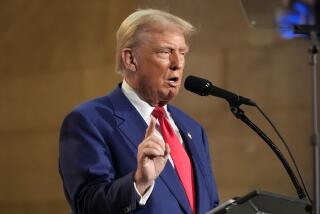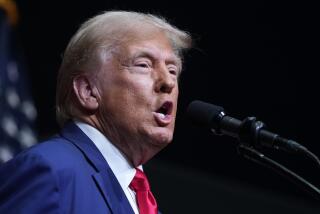Candidates focus on economic hardships
- Share via
CHARLESTON, W.VA. — Barack Obama traveled to economically struggling West Virginia on Thursday to highlight the financial costs of the war in Iraq and to attempt to tie them to hardships at home.
The Illinois senator sought to promote an economics-based argument against the war at a time when the nation is on the brink of a recession, if not already in one, and voters are placing a higher priority on economic issues.
The war remains overwhelmingly unpopular among Democratic voters, and Obama’s early opposition presents a clearer point of distinction from rival Hillary Rodham Clinton than does his approach to broad economic issues.
But media attention to Iraq has waned as the level of violence there has dropped significantly during the course of the presidential campaign.
Obama marked the war’s fifth anniversary this week with two days of speeches against the war, first on strategic grounds and then on economic grounds.
Campaigning in Indiana on Thursday, Clinton also focused on hard economic times, offering a dose of financial populism.
The New York senator seized on the $30 billion in loan guarantees that the Federal Reserve recently provided to stave off the bankruptcy of the Wall Street investment bank Bear Stearns to propose a $30-billion emergency housing “lifeline” to aid homeowners and communities threatened by foreclosures.
“We’ve seen unprecedented Fed actions over the last several days to address the crisis on Wall Street but nothing to address the crisis on Main Street,” Clinton told Bloomberg News in a telephone interview.
Obama, speaking at the University of Charleston, argued that the war in Iraq has contributed to rising gasoline prices as well as a swelling national debt that has weakened the economy.
At the same time, he said, the war is draining resources that could be used to better the lives of Americans by expanding access to healthcare, improving public education, and rebuilding roads and bridges.
“Ordinary Americans are paying a price for this war,” Obama said. “When you’re spending over $50 to fill up your car because the price of oil is four times what it was before Iraq, you’re paying a price for this war.”
Oil analysts generally have attributed the run-up in oil prices in part to instability in Iraq and uncertainty in the Middle East caused by threats of a conflict between the United States and Iran. But rising demand for oil from China and India also is generally believed to be a factor, and many analysts think it may be more important.
Obama cited estimates that the war and Iraqi reconstruction already have directly cost U.S. taxpayers half a trillion dollars and cited an estimate that the true cost of the war to the economy will reach $3 trillion by the war’s conclusion.
The projection, which a campaign spokesman said came from a calculation by former World Bank Chief Economist Joseph Stiglitz, includes the lifetime cost of caring for wounded veterans, the cost of replacing spent and damaged military equipment and the lost economic productivity of soldiers and civilian contractors killed or wounded.
Meanwhile, Arizona Sen. John McCain’s campaign suspended a staffer who sent out links to a video tying Obama to incendiary remarks about white America made by Obama’s spiritual advisor, the Rev. Jeremiah A. Wright Jr.
More to Read
Sign up for Essential California
The most important California stories and recommendations in your inbox every morning.
You may occasionally receive promotional content from the Los Angeles Times.












